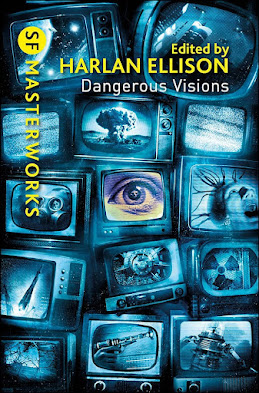Tuesday, 3 May 2022
Harlan Ellison's THE LAST DANGEROUS VISIONS to be published in 2023
Tuesday, 19 October 2021
THE LAST DANGEROUS VISIONS goes out to publishers
Saturday, 19 December 2020
Neil Gaiman to write a story for THE LAST DANGEROUS VISIONS
J. Michael Straczynski has confirmed that Neil Gaiman is the first current author to pen a story for the release version of The Last Dangerous Visions, Harlan Ellison's long, long-gestating anthology project.
As discussed previously, The Last Dangerous Visions was the third in a series of anthologies Ellison planned to publish in the 1970s, as the ultimate word on the scale and scope of the SFF field at the time. The project was immensely delayed, ballooning to enormous size, and eventually seems to have been shelved, although Ellison vowed to eventually release it. After his passing in 2018, the project was taken up by Straczynski, now serving as the executor of the Ellison Estate.
The project has been somewhat reconceived (in line with Ellison's oft-stated intentions) with the idea to include a number of new stories by modern authors in the contemporary SFF field, along with up-and-comers and even one debut author. The project is planned to be submitted for publication in 2021.
Straczynski is providing additional information on the project over on his Patreon page.
Saturday, 14 November 2020
The long, long-missing THE LAST DANGEROUS VISIONS will be published in 2021
Confirming speculation from earlier in the week, SFF scriptwriter J. Michael Straczynski, acting in his capacity as the executor of the Harlan Ellison Estate, has announced that The Last Dangerous Visions will finally be published in 2021.
The book is the third in a series of anthologies collecting the brightest and best SFF of the time. The first two books, Dangerous Visions (1967) and Again, Dangerous Visions (1972), were hailed as being groundbreaking and seminal in codifying the New Wave that was sweeping the genre at the time. Ellison announced The Last Dangerous Visions in 1972, with some notion of the book being published the following year. He formally announced a contents list for the book, which had grown to a monster three-volume project featuring more than one hundred stories, in 1979. Ellison confirmed the project remained extant throughout the 1980s and 1990s, but it never appeared, with various commentators offering speculation as to why (Christopher Priest offering a somewhat withering account in The Book on the Edge of Forever). By the 2000s it was generally accepted that the book would never be published, and Ellison's passing in 2018 seemed to be make that final.
However, the stories themselves - mostly - never went anywhere. Ellison still had them, apart from a few the authors had withdrawn over the years, and there seemed to be no formal obstacle to the book being published. There were some reports that Ellison's widow was working towards that end. With her passing this year and Straczynski taking over the Estate, the way is now open for the project to be published.
Straczynski notes his plans in detail at the above link, but broadly speaking the book will consist of:
- Most of the 81 stories originally planned for the book and not later withdrawn to be published elsewhere. Several of the stories have become massively outdated due to subsequent events and will not be included.
- Tim Kirk's artwork for the book that had been completed many years ago.
- A number of new stories by modern "heavy-hitters in the genre" to keep the volume up-to-date and relevant.
- A number of new stories by noted new voices and up-and-comers in the genre.
- One slot will be held open for a debut story by a brand new author, with submission details to follow at a later date.
- One last story by Harlan Ellison that has never been published. This story apparently ties into the reason why The Last Dangerous Visions has taken so long to come to fruition.
Rather than seeking a publisher first, Straczynski is covering all the costs of the book (including advances for the new authors) out of his own pocket; fans can help contribute to the project via Straczynski's Synthetic Worlds Patreon in the meantime.
More information on the book, including the new authors to be included, will be announced in the coming weeks and months.
Assuming the various lists issued by Ellison over the years remain accurate, the book should include the last-ever stories to appear from authors such as Frank Herbert, Anne McCaffrey, Leigh Brackett, Alfred Bester, Octavia Butler, Daniel Keyes and Vonda McIntyre, making it of remarkable genre interest.
Thursday, 12 November 2020
RUMOUR: Harlan Ellison's LAST DANGEROUS VISIONS may be coming out
Thursday, 28 June 2018
RIP Harlan Ellison
Friday, 11 September 2015
Asimov, Ellison and Wolfe talk SF
An interesting look at the SFF field from a very different time.
Saturday, 5 December 2009
Harlan Ellison volunteers to write new STAR TREK movie
This news is surprising, as Ellison has long been unhappy with the way Gene Roddenberry altered his original script and only recently settled a lawsuit with Paramount over payment issues from the 42-year-old episode. Ellison is a huge fan of JJ Abrams, director of the latest Star Trek movie, and is apparently keen to work with him.
No word on a response from Abrams or Paramount. Roberto Orci and Alex Kurtzman are still slated to work on the second Star Trek, movie, despite recently bailing on the third Transformers film.







